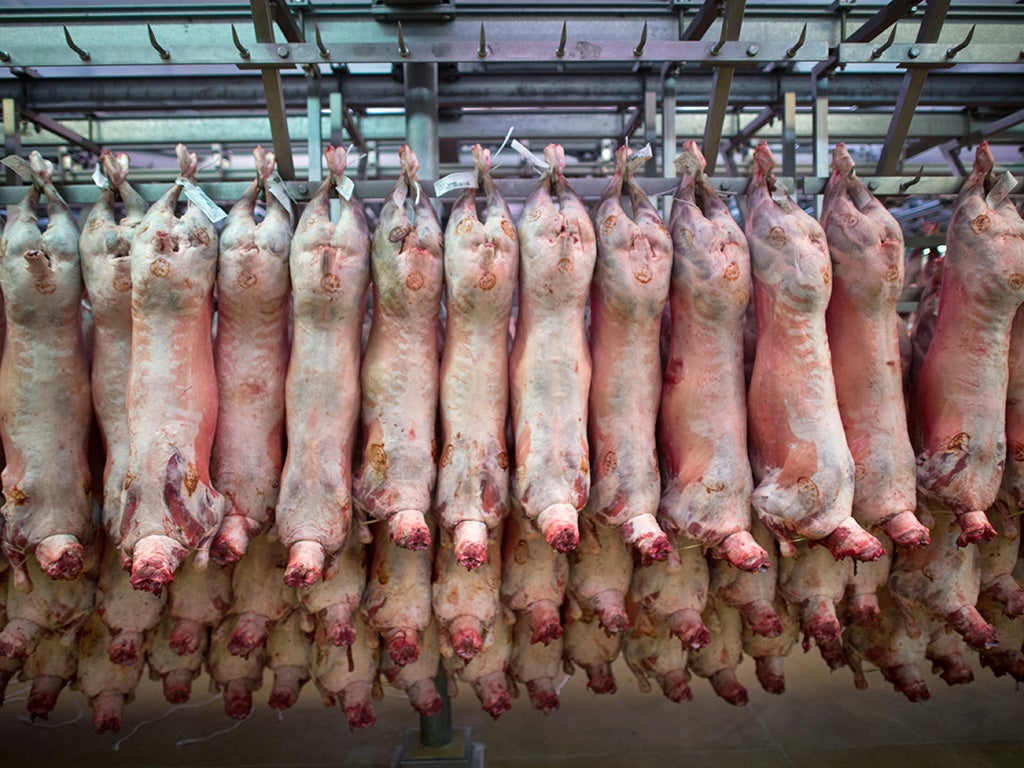Could you give up meat for just one day a week?
The world's meat consumption has quadrupled over the last fifty years. Too many of us in the west include meat in every meal without considering the other options

Your support helps us to tell the story
From reproductive rights to climate change to Big Tech, The Independent is on the ground when the story is developing. Whether it's investigating the financials of Elon Musk's pro-Trump PAC or producing our latest documentary, 'The A Word', which shines a light on the American women fighting for reproductive rights, we know how important it is to parse out the facts from the messaging.
At such a critical moment in US history, we need reporters on the ground. Your donation allows us to keep sending journalists to speak to both sides of the story.
The Independent is trusted by Americans across the entire political spectrum. And unlike many other quality news outlets, we choose not to lock Americans out of our reporting and analysis with paywalls. We believe quality journalism should be available to everyone, paid for by those who can afford it.
Your support makes all the difference.If you found out there was a simple way to cut your annual carbon emissions by as much as not driving your car for a whole month, would you do it?
Well there is – it’s called Meat Free Monday!
“Meat Free Monday, it’s a fun day, and it’s happening all around the world!” So sings Paul McCartney. And it’s true enough – more people are skipping meat and enjoying plant-based food, at least one day a week, in order to reduce their carbon footprint.
Today the McCartney family and the Rt Hon Greg Barker MP, Energy and Climate Advisor to Prime Minister David Cameron, are launching an online pledge campaign, #MFMclimatepledge, to encourage people to do just that – skip meat one day a week in order to reduce their carbon footprint and help tackle climate change.
The campaign comes ahead of the UN Climate Summit on 23 September when global leaders – from government, finance, business, and civil society – will meet in New York to discuss climate change (the first time the UN has tackled the subject since Copenhagen in 2009).

According to the Food and Agriculture Organization of the United Nations, the livestock sector is “one of the top two or three most significant contributors to the most serious environmental problems, at every scale from local to global”.
As well as being responsible for a huge chunk of global greenhouse gas emissions, meat production requires increasingly unsustainable levels of precious resources – land, water and energy – and is a major contributor towards global environmental degradation.
Nearly a third of all the land on Earth is already used for livestock and feed production. So with the world’s population expected to reach nine billion by 2050, raising enough animals to keep up with our current meat-heavy diets spells disaster for the planet. In fact, if everyone in the world ate as much meat as those in western countries, we would need 4 to 5 more planets to sustain ourselves.
Only last week, researchers at Cambridge and Aberdeen universities warned that we risk triggering unstoppable climate change unless we fundamentally rethink our relationship with meat. Their report, Importance of food-demand management for climate mitigation, isn’t the first – an increasing number of studies point to the fact that we need to start eating more plants and less meat.
Just picture it: an area of the Amazon rainforest the size of a hundred football pitches is cut down every hour to create room for grazing cattle.
.jpg)
While this might seem surprising, it isn't difficult to see why. Over the last 50 years there has been a dramatic rise in the amount of meat that people are eating. Between 1961 and 2007 the world population increased by a factor of 2.2, but total meat consumption quadrupled, with poultry consumption increasing 10-fold. The rise in meat-eating in low-meat eating populations (for instance in India and China), increases in portion sizes and world population growth have all contributed to a substantial increase in the number of animals being farmed for consumption, and the environmental damage associated with this.
There are also many people who automatically include meat in a meal, without considering other options. Renowned chef and Meat Free Monday supporter Bruno Loubet said: "It is not something you would expect a French chef to say, but you do not need meat to make an excellent dish that is exciting and full of flavour. I passionately believe that vegetables can be the star of the show".
With so many great vegetarian foods available – from soups to stews, casseroles to curries and veggie sausages, burgers and roasts – having at least one day a week without meat is an easy means of ‘doing our bit’ for the planet, while broadening our culinary horizons along the way.
Reducing our meat consumption has health as well as environmental benefits. Research performed by Oxford University found that 45,000 lives a year (and £1.2 billion in NHS costs) would be saved in the UK by people reducing their meat intake: 31,000 from heart disease, 9,000 from cancer, and 5,000 from stroke.
And of course, eating less meat is also a compassionate choice. Over 60 billion animals are farmed and killed each year, the vast majority raised in crowded feedlots or intensive factory farms.
If going meat free for one day a week sounds do-able, then there’s never been a better time to get involved.
Skipping meat for one day a week is a small change which can make a big difference. It’s positive, fun, healthy and an easy way to make a meaningful contribution to a more sustainable future.
#MFMclimatepledge: Commit to one day a week without meat by adding your name to pledge.meatfreemondays.com. Greg Barker will then present the total number of pledges at the Summit, to demonstrate the support
Join our commenting forum
Join thought-provoking conversations, follow other Independent readers and see their replies
Comments